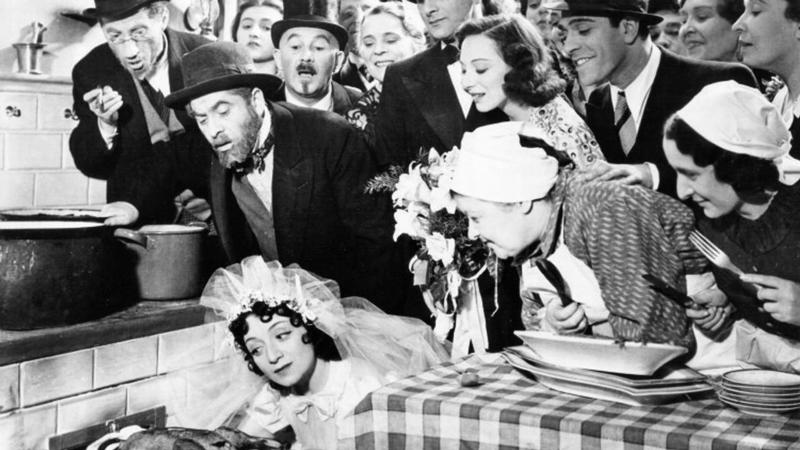By the time she made the 1938 film Mamele, Molly Picon was so well known that her name merited larger type than the title in the movie’s credits. A huge star of Yiddish stage, screen, and radio for over two decades, she owned a Broadway theater named after her. When Yiddish theater began to wither after WWII, she made the transition to acting in English. Her renown increased when she appeared alongside Frank Sinatra in Neil Simon’s Come Blow Your Horn in 1963, and in the 1971 film adaptation of Fiddler on the Roof, where she played Yente the matchmaker.
Mamele (“Little Mother”) was the follow-up to her best-known Yiddish movie, the 1936 Yidl Mitn Fidl (“Yiddle with His Fiddle”), where she played a young woman who disguises herself as a man so she can safely tour as a musician; things get complicated when she falls for another band member. Mamele also features a musician as Picon’s love interest, but this time her predicament is different: she’s promised her dying mother that she’ll take care of the family, including her five siblings and widowed father.
Though not a Yidl sequel, Mamele suffers from being hurriedly made to capitalize on that movie’s success: it’s not tightly plotted, even for a melodrama, and has a weak cast, aside from Picon. But Picon was a genuine triple threat, a gifted actress, comic, and singer, and Mamele makes full use of all her talents. Her enormous, expressive eyes are especially beguiling. When we first see her she’s grinding coffee, holding the grinder in her lap as her foot moves in imitative circles, and she blows wisps of her hair out of eyes crossed in exasperation.
And the mouth on that woman! Picon’s character, Khavtshi, is long suffering with her lazy, self-centered, no-goodnik family, but she gets in her zingers too. Responding to a sister’s kvetching, she retorts (according to the English subtitles), “Would you like a little kitten to lick your eyelids?” Her singing voice–as beautiful, warm, and expressive as her eyes–is perfectly suited to convey both the joyous and melancholy themes of the film’s klezmer songs.
Set in Lodz, Mamele was the last Jewish film made in Poland before the Nazi invasion in September 1939. It not only documents the work of a major talent, it’s an enduring record of a place, a way of life, and a people. It’s not set in a Fiddler on the Roof shtetl–it’s mid-twentieth-century Jewish life in a big Eastern European city, complete with poverty, crime, jazz clubs, and religious traditions, just before that way of life was wiped off the face of the earth.
Mamele screens at the Michigan Theater on Monday, May 8, as part of the Ann Arbor Jewish Film Festival.
Mamele
Molly Picon in a vanished world
